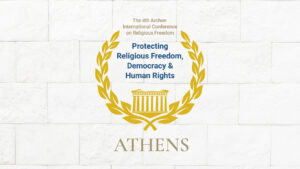Persecution of Christians in Iran: these converts to Christianity “were each convicted of the same charge – ‘propaganda against the state’ – under Article 500 of the Islamic Penal Code, which provides for up to a year in prison for anyone found guilty of engaging in ‘any type of propaganda against the Islamic Republic of Iran or in support of opposition groups and associations.’” This is absurd, as all these Christians had were Bibles, crosses, and other Christian material. But the laws in Iran that grant some limited freedoms to the Christians are generally not considered applicable to converts from Islam to Christianity, who are all too often considered enemies of the state, as we see in this case. The U.S. State Department has classified Iran as a “country of particular concern” for “having engaged in or tolerated particularly severe violations of religious freedom.”
The Order of Saint Andrew the Apostle, Archons of the Ecumenical Patriarchate, requests that the government of Iran grant full religious freedom to all of its citizens, not interfering with their freedom of worship in any way, and immediately clear these seven converts.
For previous ChristianPersecution.com coverage of Iran, see here.
“Bushehr Christians face prison, exile, work restrictions and fines,” Article 18, June 29, 2020:
Seven Christian converts in the south-western Iranian city of Bushehr have been given sentences ranging from prison and exile to work restrictions and fines.
The seven, including three married couples, received their verdicts on 21 June at the revolutionary court in Bushehr.
They were given 20 days to appeal, and intend to do so.
The four men – Habib Heydari, Pooriya Peyma, and brothers Sam and Sasan Khosravi – each received custodial sentences. Sam and Sasan also face work restrictions and exile after their release.
The three women – Fatemeh Talebi, and sisters Maryam and Marjan Falahi – were fined. Maryam, a nurse, was also given a lifetime ban on working for any national institution, including the hospital she’s worked at for 20 years.
Details of sentences
Sam and Sasan were each sentenced to one year in prison, followed by a two-year exile from Bushehr, which includes a ban on working in their specialist profession – the hospitality sector.
Habib also received a one-year prison sentence, but no exile or work restrictions. Pooriya received a 91-day sentence – the minimum jail time required to ensure the prisoner leaves with a criminal record – and again no exile or work restriction.
Sam and Sasan’s wives, Maryam and Marjan, received fines of 8 million tomans (around $400) and 6 million tomans (around $300) respectively.
Maryam’s additional lifetime ban on employment at any national institution is a severe blow after her two decades of service at the local hospital.
Finally, Pooriya’s wife, Fatemeh, received a 4 million toman fine (around $200) – equivalent to two months’ salary for the average Iranian.
The seven Christians were given their verdicts to read, but not allowed to take them home or to make copies.
They were each convicted of the same charge – “propaganda against the state” – under Article 500 of the Islamic Penal Code, which provides for up to a year in prison for anyone found guilty of engaging in “any type of propaganda against the Islamic Republic of Iran or in support of opposition groups and associations”.
The Iranian Parliament recently passed amendments to two articles of the Penal Code, including Article 500, but they do not appear to have had any impact in this particular verdict.
The amendments enable judges to label those convicted of “insulting Islam” or “propaganda against Islam” as being members of “sects”. Those convicted of membership of such groups can face flogging or even the death penalty, in addition to imprisonment and fines….
Article18’s advocacy director, Mansour Borji, commented: “Condemning these people to prison because of their possession of Bibles and Christian symbols is a clear demonstration that Iran’s Foreign Minister and others aren’t telling the truth when they say that ‘no-one is put in prison in Iran simply because of their beliefs’.
“These people have done nothing that could be construed as ‘propaganda against the state’ or ‘acting against national security’, but nevertheless they have been treated so unjustly. The international community must hold Iran to account for this miscarriage of justice, and many others like it.”







